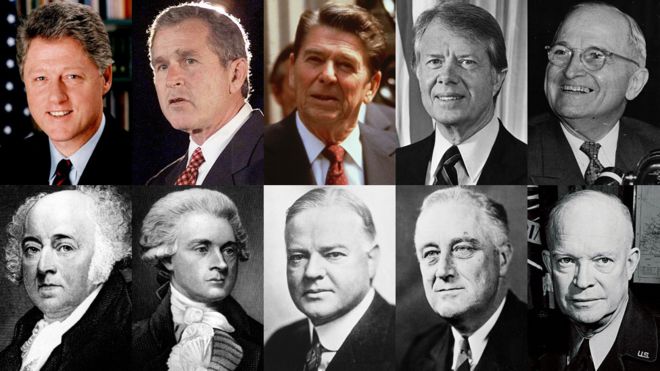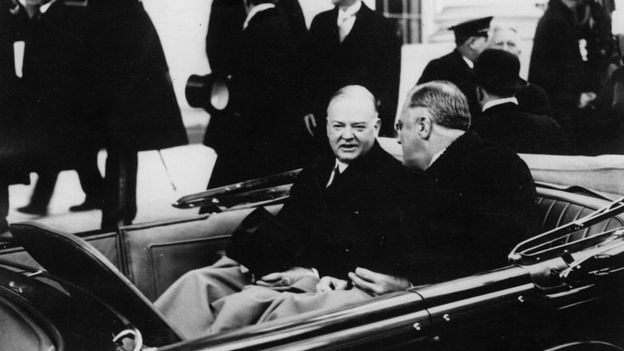Originally Posted: November 11, 2016
Dedman College expert Jeffrey A. Engel, Ph.D., is quoted in this BBC story originally published on Nov. 11. Jefferey Engel is an award-winning American history scholar and director of the Center for Presidential History at SMU. He is an expert on the U.S. presidency and American diplomatic history.
 Image copyrightGETTY IMAGES
Image copyrightGETTY IMAGESPresident Barack Obama took the first step in passing the presidential baton to his successor Donald Trump after the two spoke for more than an hour in what was meant to be a brief meeting.
“He’s a good man,” said Mr Trump, the soon-to-be 45th president, of his predecessor.
But that compliment belied years of clashes between the two men. Mr Trump has referred to Mr Obama as the “worst president” in the country’s history and led a challenge to the legitimacy of his presidency by questioning where he was born.
Mr Obama has returned stinging criticisms by calling Mr Trump “unfit” to be commander-in-chief.
Though their meeting appeared to be cordial, history has shown that the peaceful transition of power between leaders can be outright awkward.
Here is a look at some other rather uncomfortable presidential handovers.
John Adams and Thomas Jefferson
The transition between President John Adams and Vice-President Thomas Jefferson in the tumultuous election of 1800 was famously difficult, according to John Vile, a political science professor at Middle Tennessee State University and author of Presidential Winners and Losers: Words of Victory and Concession.
The acrimonious campaign was considered one of the most significant transitions of power in history after a bitterly fought election that ended with Mr Jefferson, a Democrat-Republican, defeating Mr Adams, a Federalist.
But the presidential electors failed to make clear whether they were voting for Mr Jefferson or his running mate, Aaron Burr, resulting in a tie between the two men. The House of Representatives decided the outcome, electing Mr Jefferson.
The Founding Fathers ended their friendship over the political turmoil and Mr Adams fled Washington before Mr Jefferson’s inauguration ceremony.
Franklin D Roosevelt (FDR) and Herbert Hoover
 Image copyrightGETTY IMAGES
Image copyrightGETTY IMAGESMr Hoover once described the man who beat him, Mr Roosevelt, as a “chameleon in plaid”, while FDR called his predecessor a “fat, timid capon”.
The 1932 election came amid a financial crisis that left the American economy in shambles, ultimately tarnishing President Hoover’s legacy, depicting him as a failed leader.
The two men did not like or trust each other. Mr Roosevelt dismissed President Hoover’s repeated appeals for joint actions before the transition such as issuing an emergency proclamation to limit bank withdrawals.
Instead, Mr Roosevelt wanted to demonstrate his administration starkly contrasted his predecessor’s presidency.
FDR believed Mr Hoover had not done enough to help Americans who suffered in the Great Depression, said Jeffery Engel, director of the Center for Presidential History at Southern Methodist University.
The mutual disdain was apparent on inauguration day in March 1933, when the two sat in silence in President Roosevelt’s open-top car while en route to the ceremony.
Harry Truman and Dwight Eisenhower
Though the Democratic president had worked with Mr Eisenhower in World War II and in the creation of Nato, the two shared bad blood after Mr Truman invited him to the White House in 1948, according to Barbara Perry, director of presidential studies at University of Virginia’s Miller Center.
President Truman had entertained the idea of working to nominate Mr Eisenhower as a Democratic candidate for president, but the decorated military general ultimately cast his lot with the Republican Party.
Mr Eisenhower reportedly viewed that offer as a terrible mark of leadership, according to Mr Engel.
The political clash heated up when Mr Eisenhower undermined Mr Truman’s military policy on the campaign trail, pledging to personally go to Korea to end the war on American terms.
President Truman also became irate when the general remained silent about comments made by Senator Joe McCarthy.
“He has betrayed almost everything I thought he stood for,” Mr Truman said.
The president fuelled the fire by mercilessly attacking Mr Eisenhower personally and professionally as unfit to be president, Ms Perry said.
President-elect Eisenhower ignored a pre-Christmas White House lunch invite, and on inauguration day, refused to greet Mr Truman before they left together for the ceremony.
In the aftermath, President Truman lamented that General Eisenhower was used to people doing what he said and would soon find out that the presidency did not work that way, Mr Engel noted.
“You don’t order people as the president, you have to persuade them as the president,” Mr Engel said.
“I think that’s perhaps analogous to Trump, who as a business person, could just fire someone he didn’t like. He has no idea how to work with people he can’t fire.” READ MORE